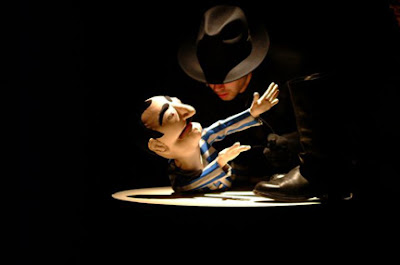Note: Culturemart 2008 is a works-in-progress presentation by resident artists at HERE Arts Center. As such, they are not open to full reviews, so I've spoken generally about them, emphasized only the things that work, and tried to talk more about the artist's goal/vision than anything overly specific to a finished product.
- Water (or, the secret life of objects)This should be the year of Sheila Callaghan. Not only will we see
Crawl, Fade to White later this year with 13P (and two more in early '09), but
Water is the opening salvo in a much longer piece that, if this is any indication, will be a series of international vignettes (in their native languages) with the common theme of water. Hence April Mattis plays a Katrina survivor, sitting, starving, on a roof, watching the press helicopters fly overhead (her thoughts literally bubble on screen behind her); Carolyn Bost and Gerardo Rodriguez play a couple from Oslo dealing with another 100-degree day; and in a series of prerecorded events, we see possible futures (in which Bloomberg is Chancellor of Saudi-America, faux fish are in, and fresh water goes for $400 a gallon) and hysterical pasts (like a retro 1985 educational video where a scientist promotes the "hard science" that disproves all the environmental alarmists). As directed by Daniella Topol, and with videos and lighting from William Cusick (the creative team from my #1 show of '05,
Dead City), the play is already a heartbreaking maelstrom of interconnected thoughts, and it's already creative, most notably in the easygoing audience participation, which I wouldn't dare spoil. I'd happily get intoxicated on this
Water, hyponatremia be damned.
- Miranda 5x
Welcome to "You Bet Their Life," a game show that lets the audience judge supposed criminals, like this week's unknown murderer. To help introduce us to the suspects, jovial host Dave (Joel Marsh Garland) and his clueless cohost, Julie Faluda (Kamala Sankaram) appear in prerecorded clips to introduce live "flashback" performances between Miranda (Sankaram) and the three men suspected of killing her. These pieces are blocked simply, with Miranda standing in front of a projection of various locales that are coupled with subtitles for her operatically cryptic conversations. She's assisted by her ensemble, Squeezebox, who provide a folksy classical spin on her arias. The most promising segment from this presentation is a fast-paced staccato song in a Starbucks that keeps Sankaram out of her falsetto, and which is coupled with some frantically edited close-ups of Miranda; as the scene continues, the melody becomes a loop for Miranda's inescapable future, and Sankaram removes herself from the role to add in a layer of gasping accordion notes, this time layered over surveillance footage from the coffee shop.
 photo: Nordland Visual Theatre
photo: Nordland Visual Theatre











































